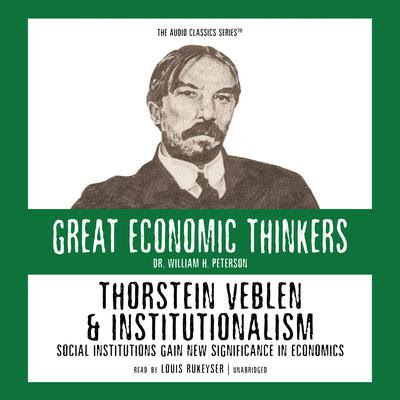I recently finished listening to an audiobook called “Monetarism and Supply Side Economics.” In a way, it was almost like two audiobooks that happened to be combined together. The script for the “Monetarism” part had a different writer than the “Supply Side Economics” part. But these two schools come to similar conclusions about a number of issues, and they were both from the same general period in economic history. Thus, it makes sense to cover them together as they do here.
Saturday, July 31, 2021
Friday, July 30, 2021
A review of “Thorstein Veblen and Institutionalism” (audiobook)
So I recently finished listening to an audiobook about the Norwegian-American economist Thorstein Veblen, who lived from 1857 to 1929. It was called “Thorstein Veblen and Institutionalism,” and it may have been as much about his “institutionalist” philosophy as it was about him.
Monday, July 26, 2021
A review of “Alfred Marshall and Neoclassicism” (audiobook)
So I recently finished an audiobook about Alfred Marshall, a British economist who lived from 1842 to 1924. This audiobook was called “Alfred Marshall and Neoclassicism.” As its title implies, it's also about an economic tradition called “neoclassicism” that Marshall helped to found. I knew almost nothing about him before I listened to this audiobook about his work; although I had heard of the neoclassical school of economics before, and already had respect for it.
Sunday, July 4, 2021
A review of “The Declaration of Independence” (audiobook)
“The history of the present King of Great Britain is a history of repeated injuries and usurpations, all having in direct object the establishment of an absolute tyranny over these states. To prove this, let facts be submitted to a candid world.”
A new country was created on July 4th, 1776. This is the aspect of the day that people remember most, of course. But people seldom quote the part of the document that actually declares our independence. Rather, they are more likely to quote from the famous second paragraph. This paragraph reads in part: “We hold these truths to be self-evident: That all men are created equal; that they are endowed by their Creator with certain unalienable rights; that among these are life, liberty, and the pursuit of happiness” (Source: text of the document). I will not endeavor to quote the rest of these words in this post. But suffice it to say that they are filled with ideas and philosophy. People remember these ideas better than the legal phrases that separated us from the mother country. That’s how important these ideas are.
A review of “The American Revolution” (audiobook)
“What do we mean by the American Revolution? Do we mean the American war? The revolution was effected before the war commenced. The revolution was in the minds and hearts of the people.”
I had already watched three television histories of the American Revolution before I ever listened to this audiobook. One was a British production called “Rebels & Redcoats: How Britain Lost America,” which was four hours long. Another was PBS’s “Liberty! The American Revolution,” which was six hours long. And the last was the History Channel’s “The Revolution,” which was ten hours long (the longest of the three). The last two were quite good, and the British production was helpful for understanding the British perspective, despite the glaring bias that one finds in it if they watch certain parts of it. But I still learned some things from this fine audiobook about the American Revolution, which is five hours long.
Subscribe to:
Comments (Atom)







